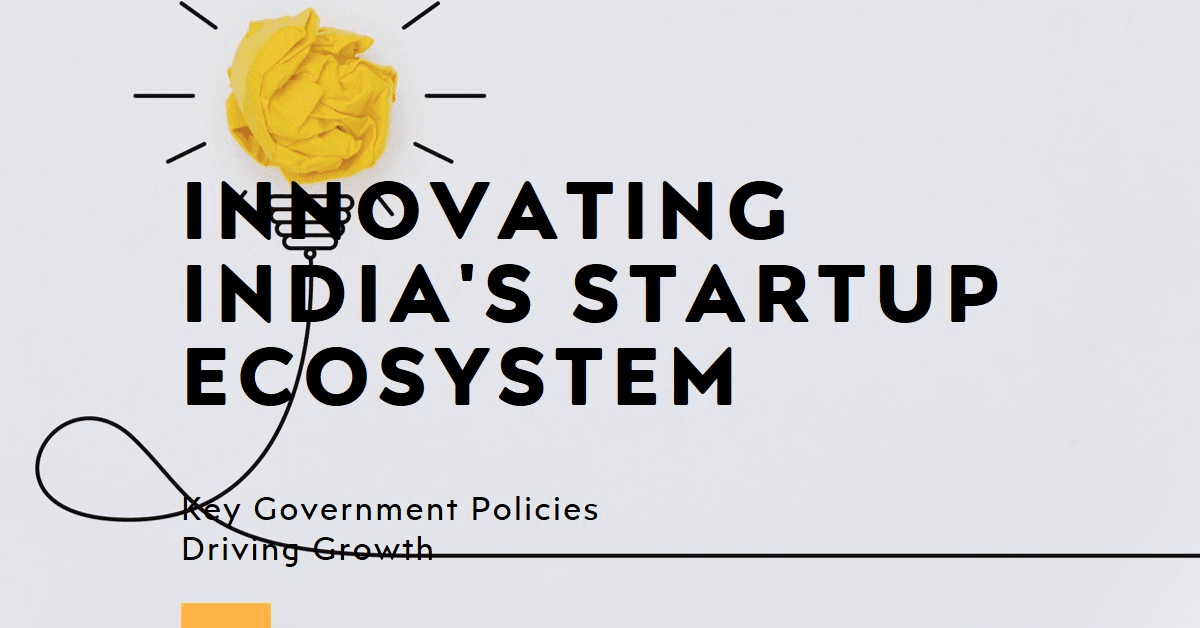India’s startup ecosystem has emerged as a global powerhouse, ranking among the top five startup hubs worldwide. In 2024, the ecosystem continues to thrive, driven by a combination of entrepreneurial talent, robust digital infrastructure, and supportive government policies. As the Indian government intensifies its focus on fostering innovation and entrepreneurship, a range of new incentives and policies are reshaping the landscape, making it easier for startups to launch, scale, and succeed. This article explores how recent government initiatives, from funding opportunities to tax breaks, are fueling the growth of India’s startup ecosystem.
1. Startup India Initiative: Building a Robust Foundation
Launched in 2016, the Startup India initiative has been the cornerstone of India’s efforts to create a conducive environment for startups. The initiative aims to nurture innovation, simplify regulations, and provide financial support to early-stage startups. As of 2024, Startup India has played a critical role in streamlining processes for entrepreneurs, including simplified company registration, access to funding, and a wide range of resources for mentorship and networking.
Simplified Compliance and Ease of Doing Business
One of the key aspects of the Startup India initiative is the simplification of compliance requirements for startups. The government has reduced the regulatory burden by introducing self-certification schemes in areas such as labor laws and environmental clearances. Additionally, the introduction of a single-window platform for startups to apply for licenses, permits, and registrations has significantly improved ease of doing business. According to a report by the Department for Promotion of Industry and Internal Trade (DPIIT), the compliance burden for startups has been reduced by 70%, enabling entrepreneurs to focus more on innovation and less on paperwork.
Funding and Incubation Support
Access to funding has been a perennial challenge for startups, particularly in their early stages. To address this, the government has launched several funding schemes, including the Fund of Funds for Startups (FFS) and the Credit Guarantee Scheme for Startups (CGSS). The FFS, with a corpus of INR 10,000 crore, invests in Alternative Investment Funds (AIFs) that, in turn, invest in startups. In 2024, the government has increased the allocation to the FFS to further bolster funding availability for startups in critical sectors such as healthtech, agritech, and deep tech.
In addition to funding, the government has established over 400 incubation centers and accelerators across the country to provide startups with the necessary support to grow. These incubators offer mentorship, access to industry experts, and connections to potential investors, helping startups navigate the challenges of scaling their businesses. For more insights on funding opportunities, explore our article on Government Funding Schemes for Indian Startups.
2. Tax Incentives and Regulatory Reliefs: Easing Financial Strain
To further support the startup ecosystem, the Indian government has introduced a range of tax incentives aimed at reducing the financial burden on startups. These measures are designed to enhance cash flow and provide startups with the financial flexibility needed to invest in growth and innovation.
Tax Holidays and Exemptions
One of the most significant incentives is the three-year tax holiday available to eligible startups. Under this scheme, startups incorporated between April 2016 and March 2024 are exempt from income tax on profits for three consecutive financial years within their first ten years of operation. This tax break is aimed at enabling startups to reinvest their profits into business expansion, research, and development. The government has extended this scheme into 2024, underscoring its commitment to fostering a supportive tax environment for new businesses.
Additionally, the government has waived the angel tax on investments received by startups from domestic investors, which was previously a major deterrent to fundraising. This exemption, combined with a reduction in long-term capital gains tax, has significantly improved the investment climate for startups. To understand how these tax incentives can benefit your startup, read our detailed guide on Tax Breaks and Exemptions for Indian Startups.
Reduction of Regulatory Barriers
The government has also introduced measures to reduce regulatory barriers that often impede startup growth. This includes amendments to the Companies Act, 2013, allowing startups to issue sweat equity shares, raise deposits, and access corporate social responsibility (CSR) funds more easily. Moreover, the abolition of the requirement for startups to maintain a minimum paid-up capital has reduced the initial financial outlay required to start a business.
The simplification of intellectual property (IP) processes is another significant regulatory reform. Startups can now avail themselves of expedited examination of patents and trademarks, reducing the time to secure IP rights from years to months. For more on navigating the regulatory landscape, explore our article on Simplifying Regulations for Startups in India.
3. Sector-Specific Policies: Boosting Innovation in Key Industries
Recognizing the diverse needs of startups across different sectors, the Indian government has introduced targeted policies to drive innovation in key industries such as fintech, agritech, healthtech, and clean energy. These sector-specific initiatives provide tailored support, from financial incentives to dedicated infrastructure and regulatory frameworks.
Fintech Sector: Digital Payments and Beyond
India’s fintech sector, one of the fastest-growing segments of the startup ecosystem, has greatly benefited from government support. The introduction of the Payment and Settlement Systems Act, 2007, amendments, and the establishment of regulatory sandboxes by the Reserve Bank of India (RBI) have created a favorable environment for fintech innovation. In 2024, new guidelines for digital lending and online payment systems are further enhancing transparency and security, fostering consumer trust in digital financial services. For a closer look at the fintech landscape, read our article on Fintech Innovations Driving Financial Inclusion in India.
Agritech: Transforming Agriculture through Technology
The government’s focus on agritech is driven by the need to modernize India’s agriculture sector, which employs over half of the country’s workforce. Policies such as the Pradhan Mantri Krishi Sinchayee Yojana and the Digital Agriculture Mission aim to integrate technology into farming practices. In 2024, the government launched a dedicated fund of INR 1,000 crore to support agritech startups working on innovations like precision farming, agri-fintech, and supply chain solutions. For more on how technology is transforming agriculture, explore our article on The Rise of Agritech in India.
Clean Energy: Encouraging Sustainable Innovation
With India’s commitment to achieving net-zero emissions by 2070, clean energy startups are playing a critical role in the country’s sustainability efforts. The government’s National Green Hydrogen Mission and incentives for electric vehicles (EVs) are providing startups in the clean energy sector with the necessary impetus to innovate. In 2024, the government announced additional subsidies for startups developing energy-efficient technologies, as well as tax incentives for investments in renewable energy projects. To learn more about opportunities in the clean energy sector, check out our article on Clean Energy Startups Leading India’s Green Revolution.
4. Future Outlook: Opportunities and Challenges
As India continues to position itself as a global startup hub, the future of its startup ecosystem looks promising. The government’s proactive approach in nurturing startups, coupled with the private sector’s increasing investment in innovation, sets the stage for sustained growth. However, challenges such as access to capital, scaling internationally, and navigating regulatory complexities still exist. Addressing these challenges will require continued collaboration between the government, industry stakeholders, and the startup community.
Looking ahead, emerging technologies like artificial intelligence, blockchain, and the Internet of Things (IoT) are expected to open new avenues for startups. Moreover, India’s push towards digital public infrastructure, exemplified by the Open Network for Digital Commerce (ONDC) and India Stack, will further democratize access to digital services, enabling startups to tap into new markets and customers. For insights into the future of India’s startup ecosystem, read our analysis on Emerging Trends in India’s Startup Landscape.
Conclusion
India’s startup ecosystem in 2024 is characterized by dynamic growth, driven by supportive government policies, innovative entrepreneurs, and a robust digital infrastructure. From funding and tax incentives to sector-specific initiatives, the government’s commitment to fostering a vibrant startup environment is clear. As the ecosystem continues to evolve, startups will play a pivotal role in driving India’s economic growth, creating jobs, and positioning the country as a global leader in innovation.
For more comprehensive insights on India’s evolving startup landscape, explore other articles on Epic Infinite, such as Navigating India’s Funding Landscape for Startups and How Government Policies Are Shaping Tech Innovation in India.










